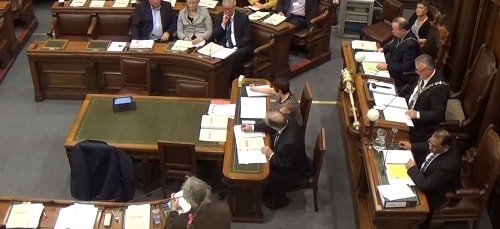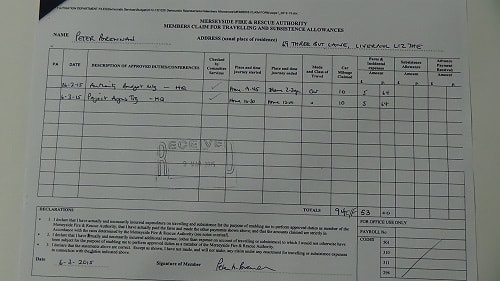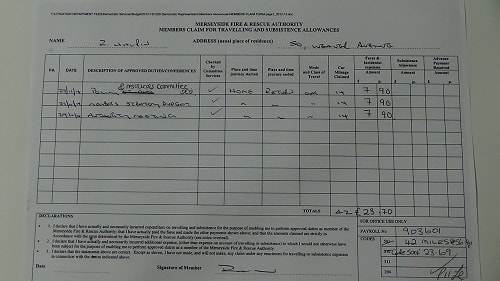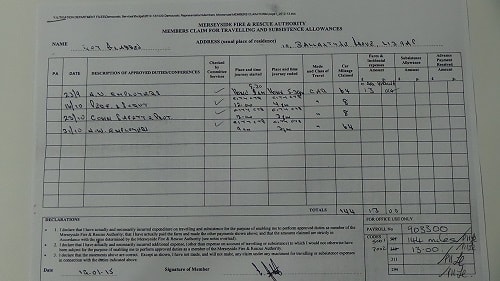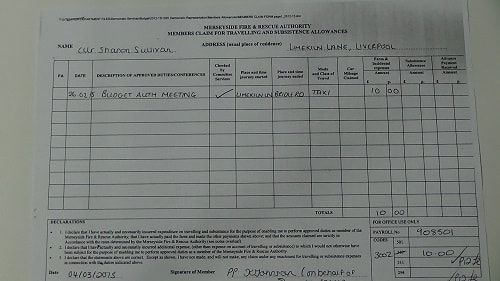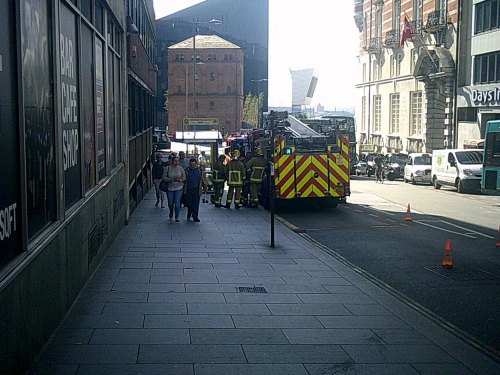A farce at Wirral Council’s public question time (Act 2, Scene 1) Is Wirral Council “open and transparent”?
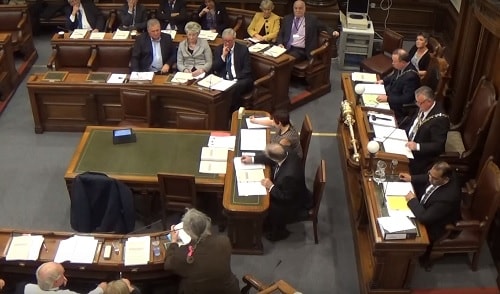
Please accept YouTube cookies to play this video. By accepting you will be accessing content from YouTube, a service provided by an external third party.
If you accept this notice, your choice will be saved and the page will refresh.
Wirral Council’s Public Question Time 14th December 2015
Before I write about the question I asked of Councillor Adrian Jones at public question time, I am going to explain some of the legal background, what’s happened so far and why there are echoes of the extreme lengths that the former Speaker of the House of Commons Michael Martin went to over MPs’ expenses.
There are a number of different laws (and a bit of history) here that apply to this, so I am going to start by explaining my understanding of them and explain why Cllr Adrian Jones has unfortunately fallen into the trap of believing things officers tell him and also getting bamboozled by some of the legal jargon. Here is a link to a transcript of a previous answer he gave.
I’m a local government elector here on the Wirral (basically that means I get to vote in elections to Wirral Council).
Each year, during the audit there is a period of about three weeks when local government electors have a legal right to inspect and receive free copies of accounts to be audited and copies of all books, deeds, contracts, bills, vouchers and receipts relating to them.
Wirral Council can remove any details of employees, but has to seek the external auditor’s permission (in this case Grant Thornton) to remove anything else.
This is detailed in this piece of legislation Audit Commission Act 1998, s.15.
Once the inspection period ends, there is then a period when questions can be asked of the auditor followed by a period when formal objections can be raised or requests for a public interest report.
In case Wirral Council thinks I’m picking on it, this year I made requests to Merseytravel (part of the Liverpool City Region Combined Authority), Merseyside Waste Disposal Authority (also called Merseyside Recycling and Waste Authority), Merseyside Fire and Rescue Authority and Liverpool City Council.
Each of those other bodies managed to respond and provide the information for inspection more or less within the inspection period.
Two of these authorities (Merseyside Fire and Rescue Authority and Merseyside Waste Disposal Authority) provided some of what I requested in electronic format.
For example this one contract that MFRA (Merseyside Fire and Rescue Authority) has that comes to over 11,000 A4 pages I could’ve requested in paper format, but didn’t as I was quite happy to receive it on one DVD as opposed to three large boxes of paperwork. The £1.2 billion contract that Merseyside Waste Disposal Authority provided is over 800 pages long.
Wirral Council however decided that providing me with what I’d estimate at 10% of what I asked for was reasonable. It’s not!
These other public bodies I refer to are much smaller (in terms of staff and budget) than Wirral Council, yet by being flexible saved to give the example as outlined above the internal costs of copying a contract of over 11,000 pages in length. Had I requested such a contract from Wirral Council I would still be waiting as they would insist on supplying it in paper format!
So getting back to what I did request. I requested the 44 page contract that Wirral Council has for providing taxi services to councillors, the Highway Services Contract with BAM Nuttall (you can read the first 83 pages here) Wirral Council spend roughly £5 to £6 million a year on this and the contract variations to the Biffa contract (I’m still waiting for the latter).
In addition to this I requested various invoices and to inspect the councillors’ expenses (I haven’t seen any of the latter and received about one in ten of the former).
To give an example of some of the invoices I requested, it answered the details of Wirral Council spending ~£7.2 million on agency staff/consultants as opposed to hiring to these positions. It showed that in one case Wirral Council made a senior member of staff redundant, then hired agency staff (at a vastly increased cost) to do their job. You can view some of the invoices relating to that here.
There are other categories of public expenditure that I requested from Wirral Council that are in the public’s interest to know about too.
Indeed, Wirral Council’s Cabinet itself has referred to this blog in its decision making. The accompanying report to the decision refers to the lease for the New Brighton Marine Point development at 2.5 which was published on this blog.
By reversing this decision Wirral Council saved ’thousands in the costs of perhaps adding an extra hour to the next Highways and Traffic Representation Panel public meeting, the cost of it then going on the agenda of the next Regeneration and Environment Policy and Performance Committee public meeting and the cost of a Cabinet Member finally making a decision (along with the associated costs of officers trying to persuade objectors to drop their objections).
I might point out that as I put this information in the public domain had Cabinet reversed their decision at an earlier stage the costs of consultation on the proposed traffic regulation order (an expensive public notice in the local newspaper etc) would have been saved too.
However going back to councillors’ expenses. As I have not seen any councillors’ expenses for 2014/15, my question to Cllr Adrian Jones must be classed as a request to exercise this legal right (The Local Authorities (Members’ Allowances) (England) Regulations 2003, regulation 15 to inspect such documents.
I do not like having to ask twice! Cllr Adrian Jones as far as I remember in his answer stated that these amounts were included in the annually published list both in answer to my question this week and earlier this year.
I would suspect that councillors’ use of taxis would be broadly comparable from year to year. So let’s test Cllr Adrian Jones’ assertion.
In response to this FOI request the taxi bill in 13/14 was ~£3k and Cllr Adrian Jones confirmed in answer to my question that for the 14/15 financial year the total cost was roughly the same.
Here are three councillors that got taxis in 13/14 and the costs:
Cllr Moira McLaughlin £755.30
Cllr Pat Hackett £700
Cllr Steve Niblock £493.90
Had anyone of those stopped getting taxis at Wirral Council’s expense the total amount for 14/15 would’ve dropped dramatically.
Yet here are the relevant amounts from the 2014/15 published list:
Cllr Moira McLaughlin £NIL
Cllr Pat Hackett £NIL
Cllr Steve Niblock £NIL
If these three councillors had all decided to give up getting taxis and the £NIL amounts were correct (the latter point Cllr Adrian Jones states in answer to my question) then the total amount would drop by ~£2k (the combined total of all three). However it hasn’t!
You can see the full exchange between myself and Cllr Adrian Jones below.
Cllr Ron Abbey (who is a member of Wirral Council’s Audit and Risk Management Committee) makes the point before Cllr Adrian Jones that it is implied that this is unlawful and isn’t that terrible to imply such a thing?
If Wirral Council is as strongly suspected from what is outlined above publishing incorrect figures, then it is breaching breach of The Local Authorities (Members’ Allowances) (England) Regulations 2003, Regulation 15(3).
Clearly as clearly outlined above, had Wirral Council not flouted a number of its other legal responsibilities I would be able to answer that question and Wirral Council’s cultural attitudes towards its legal responsibilities continue to have the effect of interfering with the freedom of the press and triggering the Streisand effect.
Councillor Adrian Jones makes the point that councillors are trusted not to misuse the public purse paying for their taxis.
Below is a claim form (as I’m being seasonal) from one of Cllr Adrian Jones’ party colleagues, a Councillor Peter Brennan (a councillor at Liverpool City Council) who claimed from Merseyside Fire and Rescue Authority (and was paid for) £5.64 for car mileage expenses to and from a carol concert at St Nicholas’ Church. In the grand scheme of things you may point out that £5.64 doesn’t matter and at least he didn’t get a taxi! However it’s the cumulative cost to the public purse of these matters and the excessive secrecy at Wirral Council that is leading to suspicion as to why despite Cllr Adrian Jones’ claims about openness and transparency that at Wirral Council they are being anything but on this politically sensitive topic!
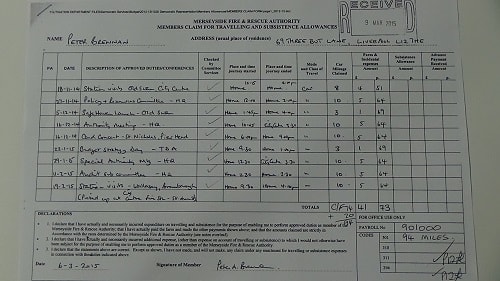
If you click on any of these buttons below, you’ll be doing me a favour by sharing this article with other people. Thanks:
